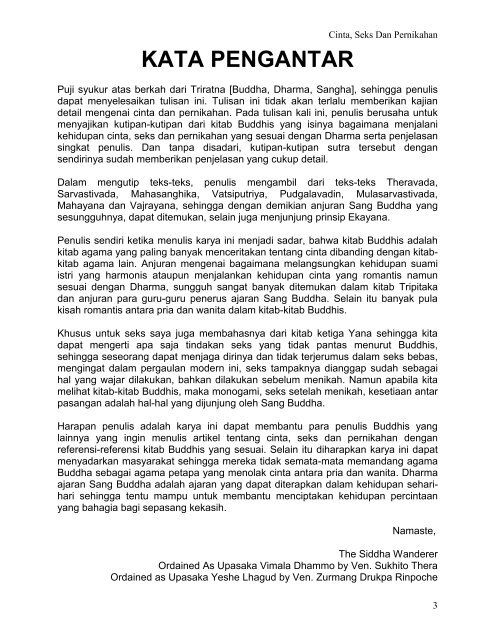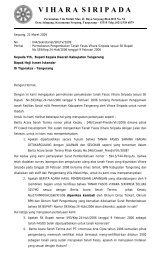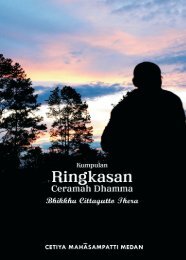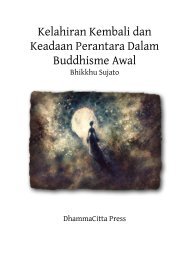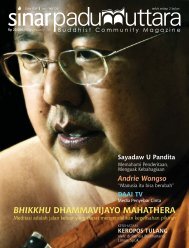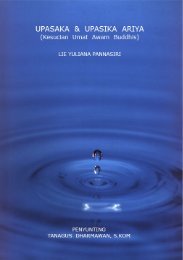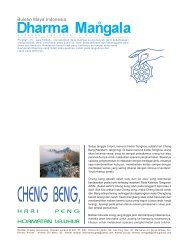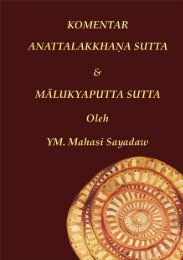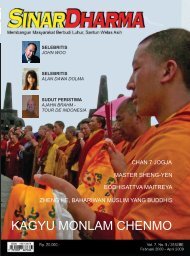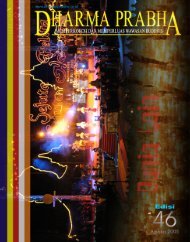Cinta, Seks, dan Pernikahan dalam Perspektif ... - DhammaCitta
Cinta, Seks, dan Pernikahan dalam Perspektif ... - DhammaCitta
Cinta, Seks, dan Pernikahan dalam Perspektif ... - DhammaCitta
You also want an ePaper? Increase the reach of your titles
YUMPU automatically turns print PDFs into web optimized ePapers that Google loves.
(a) Are the Kosovar Albanians a “people?” As the Canadian Supreme Court putit in the [1998] Secession of Quebec opinion, the meaning of ‘peoples’ is “somewhatuncertain.” At various points in international legal history, the term “people” has beenused to signify citizens of a nation-state, the inhabitants in a specific territory beingdecolonized by a foreign power, or an ethnic group.…One may argue that the Kosovars are a “people”, having inhabited Kosovo forcenturies. However, the Kosovar Albanians are more generally perceived as an Albanianethnic enclave, rather than a nation unto themselves.This definition of the word “people” as “nation” has been criticized for being toorestrictive. Consequently, it remains an open question whether widespread support ofKosovo's independence would signal a shift in the definition of “people” so that the termno longer represents a complete ethnic nation but can be used to refer to a homogenousethnic enclave within another nation.(b) Are there/were there serious human rights violations?… Here, there is at least acredible argument that the Serbs were responsible for serious human rights abuses againstthe Kosovars, as Resolution 1244 notes, a “grave humanitarian situation” and a “threat tointernational peace and security.” It was mass human rights abuses that led to NATO’s1999 intervention. (It should also be noted, however, that human rights abuses have beenreported to have been committed by Kosovar Albanians as well.) To the extent theinternational community considers it relevant whether human rights abuses are ongoingor historic, the situation in Kosovo is ambiguous. In relation to this question, one mayargue that the ongoing international presence in Kosovo is legally relevant as it isevidence of the international community’s determination that the situation in Kosovo wasand is highly volatile and that it cannot be solved completely via domestic politicalstructures.(c) Is secession the only solution? The political situation prior to the declarationof independence did not appear to offer any realistic alternatives to secession. As ofDecember 2007, the two sides could not seem to resolve their differences and the Troikahas declared the political negotiations a failure. It is unlikely that anything short ofmilitary intervention could have kept Kosovo within Serbia. Thus, it appears that most, ifnot all, realistic options other than separation had failed.As should be clear from this analysis, the basic framework provided byinternational law permits arguments for and against secession. This is the quintessential“tough case.” In the interest of systemic stability, international law has a bias againstsecession. However, if we take as a given that secession is not absolutely prohibited byinternational law, then the case of Kosovo presents a set of facts that may be persuasive:an ethnic group (though perhaps not a “nation”), within a region with historically definedboundaries (Kosovo as a province), after an international intervention to prevent ahumanitarian disaster being caused by the predecessor state, and after negotiations withthe predecessor state leading to a complete deadlock, that seeks independence via adeclaration that is coordinated with, and supported by, a significant segment of theinternational community. It thus stands in contrast to other claims of a “right” to secede…, which due to different material facts would fail under the same legal analysis.3


